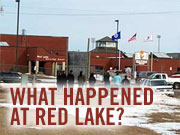March 25, 2005
 |
| Red Lake tribal chair Buck Jourdain (back to the camera) faces a huge crowd of reporters during a news conference Tuesday in Red Lake. (Photo by Scott Olson/Getty Images) |
Bemidji, Minn. — Hours after teenager Jeff Weise fatally shot 10 people, including himself, the news had traveled around the world, appearing on Web sites in Europe, Asia, and the Middle East. As the story spread, so did the interest of reporters and editors. By the next day, hundreds were streaming into the remote reservation.
Wanda Baxter teaches cultural studies on the reservation. She knew many of the victims, including Weise. And she says the media spotlight can be overpowering.
"I wasn't expecting this to happen to our students. I had no idea the media was just going to come in like this in our face," Baxter says. "I know you have to do your work and job and stuff like that, but take it easy ... when you talk to our students. Yeah, it's hard. Really hard."
Red Lake's remote location, Native culture and status as a sovereign nation have contributed to a certain level of seclusion and a bit of mistrust of the outside world.
In the wake of the tragedy, as that outside world perched on its doorstep, the tribe began to draw inward. Officials placed strict limits on media access to reservation itself. That prevented reporters from speaking to many residents who may have known the victims or the perpetrator.
Tribal chair Buck Jourdain says the restrictions were not meant to impede the work of journalists, but to protect the tribe at a vulnerable time. He questioned how many reporters were interested in Red Lake issues before the tragedy.
"Media doesn't want to come here. People do not have any reason to come here, and they could not care less," says Buck Jourdain. "But now that we have this tragedy, all the sudden our sovereignty is a question, and the way we conduct ourselves."
The restrictions eventually led to tensions, including the temporary detainment by tribal police of two photographers taking pictures of a roadside memorial. One was on assignment for the Associated Press. Dave Pyle is the AP's Minnesota bureau chief.
"We have a lot of experience of covering funerals and things like this. So we're used to trying to be very sensitive to people's feelings in tragedies," says Pyle. "But this is, you know, it's a lot more difficult."
Pyle says the journalists' equipment was confiscated, but later returned. He says AP journalists are aware of cultural differences and have acted respectfully. And he says reporters need to make a case for the role of the press and the importance of the Red Lake story.
Still, it isn't just the tribe that's grown weary. After two wounded students appeared at a hospital press conference, Darrell Auginash, an uncle of a third victim, chastised reporters.
"It's hard on these kids. You know, and sometimes you guys ask the questions that try to lead them on. Don't do that to them. They're hurting hard enough," Auginash said.
Later that day, the hospital declared reporters persona-non-grata, asking them to leave the building and not to approach hospital visitors in the parking lot.
"You guys have strong persuasion powers," said Sherri Birkeland, a spokeswoman for North Country Regional Hospital. "And these are people that have been stuck in an awful situation that they're having a horrendous time dealing with. So please, don't put that kind of pressure on them. The doctors are saying it is not in the best interest of the boys."
While the media pressure may not contribute to the boys' recovery, at least some see a potential silver lining in the attention.
Father Bill Mehrkens worked for years on the reservation. He says the reporters' stories help show another side of the Red Lake tribe, one previously hidden by distance and seclusion.
"They feel pain, emotion -- they're human beings," Mehrkens says. "And I think this is coming through. And that's a positive."
The trick, says Mehrkens, is to approach the subject with respect, sensitivity, and common courtesy.






